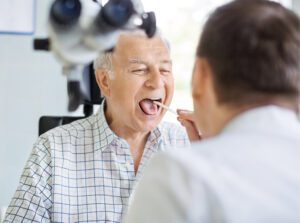 While not as common as some other types of malignancies, oral cavity and oropharyngeal (head and neck) cancers can often be discovered during routine screening exams by a dentist, medical doctor, dental hygienist, or even by self-exam. During the pandemic, many people have chosen to delay or even skip routine screening exams that can detect these cancers at an early stage, when they are more easily treatable. This has resulted in some people being diagnosed with cancers that are more advanced and more difficult to treat. It is extremely important not to skip regular screening exams with your dentist or primary care physician.
While not as common as some other types of malignancies, oral cavity and oropharyngeal (head and neck) cancers can often be discovered during routine screening exams by a dentist, medical doctor, dental hygienist, or even by self-exam. During the pandemic, many people have chosen to delay or even skip routine screening exams that can detect these cancers at an early stage, when they are more easily treatable. This has resulted in some people being diagnosed with cancers that are more advanced and more difficult to treat. It is extremely important not to skip regular screening exams with your dentist or primary care physician.
Oral, head, neck and throat cancers account for about 4% of cancers in the U.S. and are more than twice as common among men than women, according to the National Cancer Institute. Most of these cancers begin in squamous cells, which are cells that line moist surfaces, such as those inside the mouth, nose, sinuses and throat. Salivary gland cancer, another category of head and neck cancer, has many different forms because these glands are made up of many
different types of cells that can become malignant.
As you might suspect, tobacco use, heavy alcohol use, and infection with human papillomavirus (HPV) increase the risk of many types of head and neck cancer.
One of the factors that can increase your risk of oral cancer is tobacco usage of any kind; this includes
cigarettes, cigars, pipes, chewing tobacco and snuff, among others. Heavy alcohol use and excessive sun exposure to your lips can also increase your risk. In recent years, there has also been a rise in cases of oropharyngeal cancer linked to infection with human papilloma virus (HPV) in Caucasian men and women.
According to the American Cancer Society, some of the early warning signs and symptoms can include:
• A sore in the mouth that does not heal (most common symptom)
• Pain in the mouth that doesn’t go away (also very common)
• A lump or thickening in the cheek
• A white or red patch on the gums, tongue, tonsil,
or lining of the mouth
• A sore throat or a feeling that something is caught in the throat that doesn’t go away
• Trouble chewing or swallowing
• Trouble moving the jaw or tongue
• Numbness of the tongue or other area of the mouth
• Swelling of the jaw that causes dentures to fit poorly or become uncomfortable
• Loosening of the teeth or pain around the teeth or jaw
• Voice changes
• A lump or mass in the neck
• Weight loss
• Constant bad breath
Of course, many of these symptoms can also indicate conditions other than cancer; that is why it is so important to get regular dental and physical checkups. See your dentist or medical doctor right away if any of these symptoms lasts for more than two weeks.
WORLD-CLASS CANCER
TREATMENT CLOSE TO HOME
Florida Cancer Specialists & Research Institute (FCS) has a statewide network of expert, board-certified physicians who bring world‐class cancer treatments to local communities, both large and small, in locations throughout Florida. FCS is also a strategic partner with Sarah Cannon, one of the leading research and clinical trial organizations in the world. This alliance provides FCS patients access to the newest, most innovative and most promising new treatments.
Florida Cancer Specialists treats patients with all types of cancer, and offers a number of services, including an in-house specialty pharmacy, an in-house pathology lab, financial counselors at every location and 24/7 access to Care Managers, who help deliver the most advanced and personalized care in your local community.
Florida Cancer Specialists
Port Charlotte
22395 Edgewater Drive
Port Charlotte, FL 33980
Venice Island
901 South Tamiami Trail
Venice, FL 34285
Venice Healthpark
836 Sunset Lake Blvd,
Suite 101
Venice, FL 34292
Englewood
714 Doctors Drive
Englewood, FL 34223-3992
For more information, visit FLCancer.com









